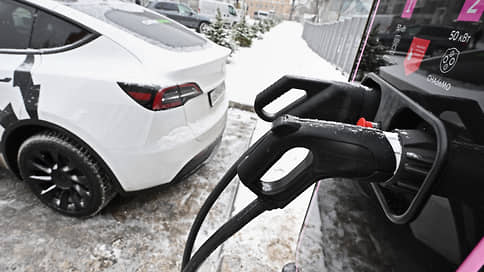Charge, cheaper – Newspaper Kommersant No. 19 (7464) dated 02/02/2023
[ad_1]

As Kommersant found out, Motorinvest, the manufacturer of electric vehicles Evolute, proposes to fix the cost of electricity for charging electric vehicles in the coming years at the level of 8 rubles. for 1 kWh. Now even the cost of electricity in the regions is mainly above 8 rubles, and the price of charging at electric charging stations (ECS) reaches 25 rubles. Market participants say that the initiative can only be implemented through subsidies. Analysts believe that state support for the segment at such an early stage of development is justified. But another idea of Motorinvest, to introduce a 10% quota for the purchase of electric vehicles in taxis and car sharing, has not yet met with understanding from potential partners.
According to Kommersant, at a meeting at the Ministry of Economy at the end of 2022, Motorinvest proposed a number of measures to stimulate the development of electric vehicles in Russia. For example, the company considers it necessary to guarantee the price of charging commercial electric vehicles at a level of up to 8 rubles. per 1 kWh for at least three to five years. Motorinvest also advocated the introduction of a mandatory quota for electric vehicles of 10% of the purchase of cars for taxi and car sharing fleets. The company did not comment on their ideas, the Ministry of Economy told Kommersant that they were being worked out.
Lipetsk Motorinvest produces electric vehicles based on Chinese cars under its own Evolute brand. Cars are also delivered to taxi and car sharing parks.
Now the cost of charging at public EZS is much higher: 15-25 rubles. for 1 kWh, market participants told Kommersant. Eduard Mingazhev, General Director of Citydrive, notes that the company “would welcome the initiative to fix the price at the level of 8 rubles. for 1 kWh”. However, he admits that such a charging cost looks “too optimistic” given the increase in electricity tariffs and inflation.
“For servicing a large fleet, the speed and availability of EZS is more important,” Mr. Mingazhev emphasizes. “If charging is cheap, but long, we will not be able to promptly bring cars to the line.”
At the same time, Citydrive does not support the establishment of quotas for the purchase of cars: “When choosing cars, we look at the demand and interest of users, and economic feasibility. If the company is ready to support the taxi industry with discounted rates for electric vehicles for several years, this will be a good alternative to replenish existing partner fleets.”
The idea of mandatory quotas for electric vehicles in fleets seems “premature” to Citymobil, since there is not yet sufficient experience in using such vehicles. Yandex.Taxi agrees that in the context of a general shortage of cars, quotas in favor of certain manufacturers or types of transport may create an “additional burden on fleets.” They see the potential in electric vehicles, but for their introduction “favorable conditions are important, including competitive prices for electricity.”
EZS operators purchase electricity at tariffs from 6 to 10 rubles. for 1 kWh, Punkt E notes (owns 165 EZS in the Russian Federation). In most regions, the tariff is higher than 8 rubles, and the price of charging cannot be equal to the purchase price for electricity, they specify there. According to Kommersant’s estimates, in 30 regions of the Russian Federation the final price of electricity for commercial consumers at low voltage exceeds 8 rubles. for 1 kWh, and in 19 regions it is 7-7.9 rubles. To reduce the price of charging to 8 rubles. for 1 kWh, taking into account operating costs for the maintenance and depreciation of EZS, subsidies will be required, according to Punkt E. In addition, powerful 150 kW stations are needed for taxis and carsharing, and the retail tariff for them is up to 20 rubles, they explain in companies.
In general, the cost of fast charging in Russia today reaches 30 rubles. per 1 kWh, but this level remains one of the lowest in Europe (for example, in Germany, Belgium – €0.69 per 1 kWh), they say in the Green Drive operator (25 EZS in the Russian Federation). Tariff 8 rub. for 1 kWh deprives the EZS development business of sense, since it becomes unprofitable. Even the current tariffs for charging services at the Green Drive EZS at the level of 20 rubles. for 1 kWh, regardless of the region, they are low-margin, according to the company.
Rosseti notes that taxi fleets and car sharing companies, when transferring fleets to electric vehicles, will be able to load the charging infrastructure by 60-70%. “Then the cost of charging will be significantly reduced, which will entail a reduction in tariffs and guarantee the payback of projects for the installation of EZS in the medium term,” the company explains. Now the price of charging at the Rosseti EZS from region to region is 15–25 rubles, but “special conditions” are provided for corporate clients.
Automotive expert Vladimir Bespalov notes that if investments are included in the tariff for EZS, then it obviously cannot equal the cost without subsidies. The development of electric vehicles is necessary, including for regional authorities, so it makes sense to discuss government subsidies. In the long term, the cost of electric vehicles themselves will decrease, and the demand for infrastructure will grow, Mr. Bespalov concludes: then you can refuse to support the segment.
[ad_2]
Source link





